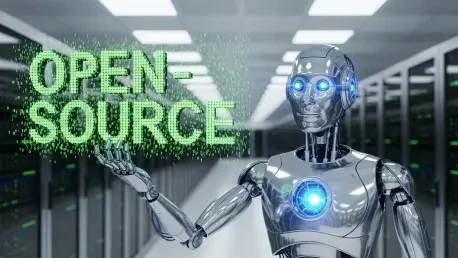Introduction to Enterprise AI and the Eclipse Initiative
In today’s fast-paced digital landscape, enterprises are increasingly turning to artificial intelligence to drive efficiency, yet a staggering gap persists between innovative AI tools and the robust, legacy systems that underpin most corporate infrastructures, posing a significant challenge as organizations strive to adopt AI without upending decades of investment in established technology stacks. The urgency to integrate AI seamlessly into existing environments has never been more critical, with many companies seeking solutions that align with their operational realities rather than forcing wholesale changes.
The Eclipse Foundation, a renowned leader in fostering open-source innovation, steps into this arena with a transformative offering through the Eclipse LMOS (Lightweight Multi-Agent Orchestration System) project, accompanied by the Agent Definition Language (ADL). This initiative is specifically tailored for Kubernetes-based systems, providing a platform that enables enterprises to deploy AI agents without abandoning familiar frameworks. By focusing on compatibility with cloud-native architectures like Kubernetes and Istio, LMOS offers a practical pathway for organizations to harness AI capabilities within their current skill sets.
Key players in this space, including contributors from both the Java Virtual Machine (JVM) and Python ecosystems, are shaping the trajectory of enterprise AI integration. The Eclipse Foundation’s emphasis on open collaboration ensures that technological influences from diverse communities converge to address real-world needs. As cloud-native architectures become the backbone of modern enterprise settings, solutions like LMOS are poised to redefine how AI is embedded into scalable, stable systems, setting a new benchmark for innovation without disruption.
The Technological Landscape of AI in Enterprises
Key Trends Shaping Enterprise AI Adoption
Enterprise AI adoption is currently marked by a notable divide between the rapid, prototype-driven Python ecosystem and the stable, long-standing JVM-centric systems that dominate corporate environments. This bifurcation often creates friction, as Python-based tools excel in agility but struggle with integration into enterprise-grade infrastructures. A growing trend toward hybrid solutions is emerging, where platforms aim to blend the best of both worlds, ensuring that innovation does not come at the expense of reliability.
Cloud-native AI orchestration is another pivotal trend, with technologies like Kubernetes enabling seamless scalability and management of AI workloads. Enterprises are increasingly prioritizing solutions that offer stability alongside the ability to handle dynamic demands, minimizing operational hiccups during implementation. The shift toward such architectures reflects a broader recognition that AI must adapt to existing DevOps practices rather than requiring entirely new workflows.
The evolving needs of businesses also highlight opportunities to reduce disruption during AI integration. By leveraging familiar tools and environments, companies can lower the learning curve for their teams while accelerating deployment timelines. This approach not only preserves existing investments but also fosters a culture of incremental improvement, ensuring that AI adoption aligns with strategic objectives without overwhelming resources.
Market Insights and Growth Potential
Recent data underscores the accelerating pace of enterprise AI adoption, with a significant portion of organizations actively seeking open-source solutions to avoid vendor lock-in and enhance flexibility. Industry reports indicate that the demand for platforms capable of integrating AI into legacy systems is projected to grow substantially over the next few years, from the current year through 2027. This surge reflects a broader push for cost-effective, scalable tools that can bridge technological divides.
Platforms like Eclipse LMOS are expected to play a crucial role in this expansion, offering a bridge between disparate ecosystems while maintaining enterprise-grade reliability. Real-world implementations, such as Deutsche Telekom’s deployment of LMOS, provide concrete evidence of success, with metrics showing the handling of millions of sessions monthly across multiple regions and a marked reduction in operational overhead. Such outcomes suggest a strong market potential for solutions that prioritize practical integration.
Looking ahead, the impact of open-source AI orchestration tools is anticipated to reshape enterprise strategies, driving wider adoption across industries like telecommunications and finance. The ability of LMOS to compress development cycles and reduce costs positions it as a catalyst for market growth. As more organizations witness tangible benefits, the momentum toward cloud-native, open-source AI solutions is likely to intensify, paving the way for broader real-world applications.
Challenges in Integrating AI with Enterprise Systems
A primary hurdle in enterprise AI adoption lies in the compatibility issues between cutting-edge AI tools, often rooted in Python, and the JVM-based systems that form the backbone of many corporate operations. This mismatch frequently results in integration complexities, where deploying AI agents risks destabilizing existing processes. Enterprises must navigate these technical barriers without compromising the integrity of their core systems.
Beyond technical challenges, the high costs associated with retraining teams on unfamiliar technologies pose a significant obstacle. Assembling specialized talent or upskilling current staff can strain budgets, while the fragility of AI models—susceptible to breaking with minor updates—adds another layer of risk. These factors often deter organizations from pursuing AI initiatives, as the perceived return on investment remains uncertain amidst such uncertainties.
Eclipse LMOS offers strategic solutions to these pain points by enabling the use of familiar tools and reducing migration expenses. By aligning with Kubernetes environments and compressing development cycles, the platform mitigates complexity in managing AI agents and ensures stability during deployment. Addressing real-world issues like lengthy implementation timelines, LMOS provides a framework that allows enterprises to innovate incrementally, preserving operational continuity while embracing AI’s potential.
Regulatory and Compliance Considerations for Enterprise AI
The regulatory landscape for enterprise AI adoption is increasingly stringent, with data privacy and security standards at the forefront of compliance requirements. Governments and industry bodies worldwide are imposing rigorous guidelines to ensure that AI systems safeguard sensitive information and maintain auditability. For enterprises, navigating this complex web of regulations is essential to avoid penalties and protect stakeholder trust.
Eclipse LMOS and ADL address these compliance needs through built-in features such as version control and traceability of agent behaviors, ensuring that every action can be documented and reviewed. These capabilities are particularly vital in sectors with heavy oversight, where transparency in AI operations is non-negotiable. By embedding such mechanisms, the platform helps organizations meet regulatory expectations without requiring extensive custom solutions.
Compared to proprietary systems, open-source frameworks like LMOS promote greater transparency, aligning with regulatory demands for clarity and accountability. The collaborative nature of open-source development allows for community scrutiny, which often results in more robust security practices. As enterprises prioritize compliance alongside innovation, platforms that inherently support these dual goals are likely to gain traction in regulated industries.
Future Outlook for AI Agent Orchestration in Kubernetes
The potential for Eclipse LMOS to emerge as a standard for AI agent orchestration is significant, drawing parallels with how Kubernetes revolutionized container management. By providing a cohesive, cloud-native platform, LMOS addresses the fragmented nature of current AI deployment practices, offering a unified approach that could redefine industry benchmarks. Its focus on seamless integration positions it as a frontrunner in shaping the next generation of enterprise AI tools.
Emerging innovations, such as the LMOS protocol designed for interoperability, highlight the platform’s forward-thinking vision. This protocol aims to facilitate communication across organizational boundaries, fostering a more connected ecosystem for AI agents. Coupled with community-driven development under the Eclipse Foundation, these advancements suggest a future where open collaboration drives standardization and adaptability in AI orchestration.
Several factors will influence the long-term success of LMOS, including competition from other protocols and its ability to keep pace with evolving AI trends. Staying aligned with global enterprise needs, particularly around scalability and regulatory compliance, will be critical. As the landscape continues to shift, the platform’s capacity to balance innovation with practical application will determine its enduring impact on Kubernetes-based AI deployments.
Conclusion and Strategic Recommendations
Reflecting on the insights gathered, it becomes evident that Eclipse LMOS and ADL have carved a significant niche as transformative tools for enterprise AI integration within Kubernetes environments. Their ability to harmonize cutting-edge AI with established JVM systems addresses a critical gap, enabling organizations to innovate without sacrificing stability. The real-world validation through implementations like Deutsche Telekom’s underscores their practical value, demonstrating measurable improvements in efficiency and scalability.
Moving forward, enterprises are encouraged to explore open-source, cloud-native solutions like LMOS as a cornerstone of their AI strategies. Investing in platforms that prioritize compatibility and community support could yield substantial long-term benefits, reducing dependency on proprietary systems. Additionally, focusing on building internal expertise around Kubernetes and related technologies will empower teams to maximize the potential of such tools.
A key consideration for the future rests in fostering partnerships with open-source communities to stay ahead of regulatory and technological shifts. Enterprises need to actively monitor advancements in interoperability protocols to ensure seamless integration across diverse systems. By adopting a proactive stance—embracing incremental innovation and leveraging proven solutions—organizations can navigate the complexities of AI adoption with confidence, setting a foundation for sustained growth in an increasingly intelligent digital era.









